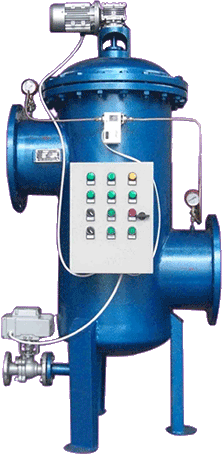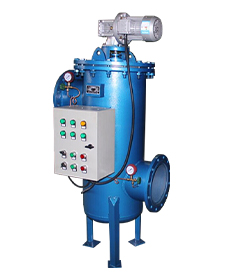In the modern industrial and commercial landscape, maintaining the purity and quality of fluids is of utmost importance. Self-cleaning filters have emerged as a revolutionary solution, offering continuous and efficient filtration while minimizing maintenance efforts. These filters are designed to automatically clean themselves, ensuring uninterrupted operation and reliable performance in a variety of applications.

Self-cleaning filters operate on the principle of screening or straining. The filter element, which is typically made of a porous material such as stainless steel mesh or synthetic fabric, allows the fluid to pass through while trapping the contaminants. As the fluid flows through the filter, the larger particles and impurities are retained on the surface of the filter element, thereby purifying the fluid that passes through to the other side.
The self-cleaning feature is what sets these filters apart. There are several methods by which self-cleaning occurs. One common method is the use of backwashing. In this process, when a certain level of pressure drop across the filter is detected, or after a pre-set time interval, the flow direction is reversed. The clean fluid on the downstream side is then pumped back through the filter element in the opposite direction, dislodging the accumulated contaminants and flushing them out through a 排污口 (drain port). Another method is the use of mechanical scrapers or brushes. These are attached to a rotating shaft or mechanism that moves across the surface of the filter element, physically removing the contaminants. Some advanced self-cleaning filters may also use ultrasonic or pulsed air technologies to enhance the cleaning process.
The heart of the self-cleaning filter is the filter element. It is available in different materials and configurations to suit various applications. Stainless steel filter elements are durable and resistant to corrosion, making them suitable for harsh industrial environments. Synthetic filter elements, on the other hand, may offer better filtration precision and are often used in applications where finer particles need to be removed. The filter element can be in the form of a cylindrical cartridge, a flat screen, or a pleated structure, depending on the specific design and flow requirements of the filter.
The housing and frame of the self-cleaning filter provide structural support and protection to the filter element. They are usually made of robust materials such as cast iron, stainless steel, or plastic, depending on the application and the nature of the fluid being filtered. The housing is designed to withstand the pressure and flow conditions of the system and to ensure a tight seal to prevent any leakage. It also houses the mechanisms for self-cleaning, such as the backwashing valves, the rotating shafts for mechanical cleaners, or the ultrasonic generators in case of ultrasonic cleaning.
A key component of the self-cleaning filter is its control system. This system monitors the pressure drop across the filter, the flow rate, and other parameters. It is programmed to trigger the self-cleaning process when the preset conditions are met. The control system may be a simple mechanical timer or a more advanced electronic controller with sensors and programmable logic. It can also be integrated with the overall automation system of the plant, allowing for remote monitoring and control.

The primary function of a self-cleaning filter is to provide continuous filtration of fluids. Unlike traditional filters that require manual cleaning and replacement, which leads to downtime, self-cleaning filters can operate 24/7. They ensure that the fluid being processed is constantly purified, maintaining the quality and integrity of the process. This is crucial in applications where any interruption in the flow of clean fluid could cause significant disruptions, such as in manufacturing processes, water treatment plants, or oil and gas operations.
By automatically cleaning themselves, self-cleaning filters significantly reduce maintenance costs and labor. Manual cleaning of filters is not only time-consuming but also requires skilled personnel and often involves the shutdown of the system. With self-cleaning filters, the need for frequent filter replacement is also minimized, as the effective self-cleaning process extends the life of the filter element. This results in overall cost savings for the operation and maintenance of the filtration system.
The removal of contaminants by the self-cleaning filter helps protect downstream equipment from damage and wear. In industrial processes, for example, clean fluid is essential for the proper operation of pumps, valves, heat exchangers, and other equipment. By ensuring the purity of the fluid, self-cleaning filters can improve the efficiency and reliability of these equipment, reducing the risk of breakdowns and costly repairs. Additionally, in some applications, such as in cooling water systems, clean water can improve heat transfer efficiency, leading to energy savings.
In the water treatment industry, self-cleaning filters are widely used in various processes. They are used in pretreatment to remove large particles and debris from raw water, in filtration systems for municipal water supply and wastewater treatment plants, and in industrial water treatment for processes such as reverse osmosis pre-filtration. Self-cleaning filters help to ensure the quality of the treated water and protect the expensive membrane filtration systems downstream.
The oil and gas industry relies on self-cleaning filters for filtration in drilling operations, production, and transportation. They are used to filter out solids and impurities from drilling mud, crude oil, and natural gas. Self-cleaning filters help to prevent clogging of pipelines, protect equipment in refineries, and ensure the quality of the final products. In offshore applications, where maintenance is more challenging and costly, the reliability and self-cleaning capabilities of these filters are especially valuable.
In manufacturing industries such as automotive, electronics, and food and beverage, self-cleaning filters are used to filter process fluids, cooling lubricants, and air. They help to maintain the quality of the products by removing contaminants that could affect the manufacturing process or the quality of the final product. For example, in the electronics industry, clean air is essential to prevent dust particles from contaminating sensitive electronic components during manufacturing. Self-cleaning filters in the air ventilation systems ensure a clean and controlled environment.
In agricultural applications, self-cleaning filters are used in irrigation systems to filter out sediments and impurities from water sources. This ensures that the water sprayed on crops is clean and free from harmful particles that could clog the irrigation nozzles or affect the growth of the plants. Self-cleaning filters also help to protect the pumps and other equipment in the irrigation system, reducing maintenance and increasing the efficiency of water distribution.
Self-cleaning filters have revolutionized the filtration process in numerous industries by providing efficient, continuous, and low-maintenance filtration solutions. Their unique working principle, combined with their well-designed composition, allows them to perform effectively in removing contaminants and ensuring the smooth operation of various processes. The applications in water treatment, oil and gas, manufacturing, and agriculture demonstrate their versatility and importance in maintaining the quality and integrity of fluids and protecting equipment. As technology continues to advance, self-cleaning filters are likely to become even more sophisticated and efficient, further enhancing their role in different industrial and commercial applications and contributing to sustainable and reliable operations.
{sval:sql sql='SELECT n_parameter FROM dede_addonarticle WHERE aid = ~aid~ ' } {/sval:sql}
{sval:sql sql='SELECT n_parameter FROM dede_addonarticle WHERE aid = ~aid~ ' } {/sval:sql}




















